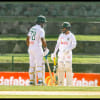Shanto blames ‘mental lapses’ as home woes mount

During the current ICC World Test Championship cycle, Bangladesh Cricket Board (BCB) opted for a significant shift -- moving away from spin-friendly pitches to more balanced, sporting wickets for home Tests. The change came after years of criticism, with many arguing that doctored pitches may have helped secure occasional home wins but left the team exposed abroad, where they consistently suffered heavy defeats.
Criticism had long come from all quarters -- journalists, organisers, administrators, players and coaches -- over the preparation of pitches tailored to Bangladesh's spin strength. But once BCB committed to preparing fairer wickets for both domestic and international matches, the response was largely positive.
And initially, the gamble appeared to work as the Tigers began to show results overseas. Last year, they won three of their six away Tests -- the most in a single year in their history. Highlights included a historic first-ever Test series win against Pakistan and a long-awaited victory over the West Indies on their turf after 15 years.
However, the picture at home was less encouraging. Since beating New Zealand in the opening match of the WTC 2023–25 cycle at Sylhet International Cricket Stadium in November 2023, Bangladesh have lost six consecutive home Tests -- the latest being a three-wicket defeat to Zimbabwe at the same venue yesterday, which gave the visitors a 1–0 lead in the series.
As in this Test match -- where Bangladesh batters failed to put up good totals on the board -- managing only 191 and 255 runs in their innings -- the main reason behind their home Test debacle has been the inconsistent performance from their batters.
Out of the 14 home Test innings since the start of the last WTC, the Tigers have folded for under 200 on nine occasions, and only four times have they crossed the 300-run mark. Meanwhile, during this same period, their highest score was 338 runs against New Zealand in Sylhet.
Captain Najmul Hossain Shanto, who has led the side throughout this period, was asked to explain their continued poor form despite the shift to better wickets. He didn't go into great detail, but admitted that "mental lapses" and poor decision-making were to blame.
"It's difficult to say what the problem is. If you see our batting, all were soft dismissals. I don't think we threw away our wickets to good balls," Shanto said during a press meet after the match.
"There can be mental errors and every individual can talk about their dismissals. I reckon the batters should have taken more responsibility -- especially those who were dismissed after getting set at the crease."
Bangladesh will have a chance to redeem themselves in the second and final Test, starting April 28 in Chattogram. However, unless they address the problems quickly, they risk further embarrassment -- particularly against a Zimbabwe side that just ended a four-year wait for a Test win.

 For all latest news, follow The Daily Star's Google News channel.
For all latest news, follow The Daily Star's Google News channel. 








Comments